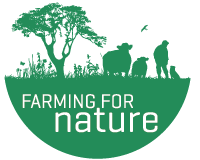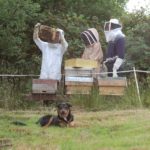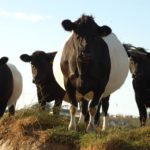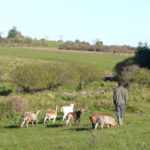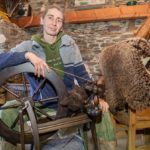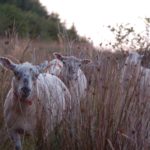Ragna Gruendler
Ragna Gruendler, along with her partner Baptiste Zorin, run Cloontabonnive Farm in West Clare. The 28-acre farm was in poor condition when they took over back in 2012. They have since put tremendous effort into restoring the land and creating/protecting habitats on the farm. A nature lover at heart and an agroforester by trade, Ragna has spent many years planting trees all over the farm to improve the soil structure and increase the fertility of the land. In 2013, 5 acres was planted under the native woodland scheme with a variety of trees including alder, birch, oak, hazel, whitethorn, blackthorn, willow and rowan. Ragna has continued to plant many more trees to create a network of hedgerows, woodland areas and nature corridors throughout the farm. Flowering and fruiting trees such as apple, wild cheery and plus have been incorporated into the agroforestry system as well.
A believer in the importance of diversity on farms, Ragna currently keeps a small herd of Aubrac Galloway x Wagyu cattle, a few sheep and a variety of poultry. Most of the animal produce is for the house. As different animals have different grazing patterns, the variety of animals play an important role in managing the grassland and grazing the agroforestry. Given the wet and heavy soil, the stocking density is very low and the animals overwinter indoors to avoid poaching the land. Ragna is also one of the directors of Inagh River EIP, a farmer-led biodiversity enhancement project in a farm, forestry and raised bog area to address habitat fragmentation and enhance biodiversity and water quality.
Nomination:
‘Two dreamers, a lot of animals and a dream to be in harmony with nature and give others the possibility to come, and experience our little piece of heaven.’ Cloontabonnive agroforest is a 28 acre farm located in County Clare that is run by Ragna Gruendler and her partner Baptiste. Their goal is to create a sustainable agroforest that includes trees, shrubs, fruit and vegetables and livestock, all working in harmony to create a biodiverse haven. It started with the purchase of the farmhouse and 1 hectare of land in 2008. Fast forward 4 years and the beginnings of the agroforest began when a further 10 hectares were purchased. The land was in poor condition with no drainage and needed a great deal of work and careful grazing management to create workable lands that encourage and support a plethora of flora and fauna. As different ruminants graze differently Ragna understands the importance of rotating livestock. Pigs and poultry have a role in land management, along with the cattle and sheep. At Cloontabonnive currently there is a small herd of Belted Galloway crosses and mixed sheep, a variety of poultry and a peacock! There have been numerous pigs and goats in the past but not currently. There are several beehives and Ragna’s pride and joy – a large wormery! The woodlands include 5,000 native trees in a 5 acre plot that were all planted in just one day, as part of the One Million Trees in a Day project. Species include alder, birch, oak, hazel, whitethorn, blackthorn, willow and rowan. As well as producing food Ragna spins wool from the sheep. This is used to make rugs and felt toys. Ragna also treats the sheep skins and cures them the traditional way with a blunt knife and plenty of elbow grease. Nothing goes to waste. Ragna has been involved with ongoing community projects such as Connolly Tidy Village and she completed a heritage course in 2018, Reading Your Local Landscape, identifying and recording the heritage features of Cloontabonnive before helping to establish the Cloontabonnive Bog Walk. Ragna is also one of the directors of Inagh River EIP-AGRI, a farmer-led biodiversity enhancement project in a farm, forestry and raised bog area to address habitat fragmentation and enhance biodiversity and water quality. The project was recently awarded the fifth highest grant amount countrywide and the highest amount in County Clare. Ragna has a deep understanding of the land, and of the animals that help manage and sustain the land. She believes animals should be put back in the environment they are meant to be in, a mixture of pasture and open woodlands. Ragna wants her farm to be accessible to the public, for walks, workshops, to buy eggs, or whatever else they can provide. The goal is to be sustainable and self-sufficient, with any surplus being shared with friends and neighbours, and it looks like Ragna is making good progress, with dreams becoming reality.
Nominator: Caroline Rowley, Ethical Farming Ireland
Nomination 2:
Ragna Gruendler and her partner Baptiste Zorin farm in Cloontabonive, Connolly, West Clare. She runs Cloontabonive-agroforest and is part of the Inagh European Innovation Partnership (EIP). She is an agroforester by training with a lifetime love of nature and all it offers us. She is heavily involved with the Inagh EIP, which is delivering a new approach to address the joint concerns of biodiversity and habitat loss while concurrently helping halt the loss of high ecological status water bodies by developing catchment sensitive farming and forestry practices. The overall aim is to demonstrate that biodiversity loss can be minimised, and site-specific mitigation measures can be implemented by farmers, scientists and advisors working together on a catchment scale. Ragna and Baptiste have been involved with the Inagh EIP since long before its formal establishment. They hosted many of the planning meetings to co-design and develop the suite of farming measures now being implemented since June 2021. This ensured that the project is a truly locally-led collaborative partnership, with farmers centrally involved in the co-design and implementation of an innovative suite of farming and forestry measures with local farmers working to address the biodiversity loss, habitat fragmentation and water quality concerns identified. The Inagh EIP partnership includes numerous stakeholders (local farmers; local forestry owners, Clare County Council, Forestry Service, Inland Fisheries Ireland, Waterford Institute of Technology, LAWPRO, ASSAP and others) who have extensive expertise in managing and delivering collaborative projects focused on farming for conservation, biodiversity enhancement and ‘Woodlands For Water’ and forestry for nature. The Inagh EIP is now at the full implementation stage and is supporting local farmers, forestry owners and members of the local community to address the challenge of biodiversity loss while working to enhance habitat connectivity in the Upper Inagh River catchment. Ragna Gruendler has played a leading role in developing and piloting the practical biodiversity actions and the suite of measures currently being implemented to address biodiversity loss and habitat fragmentation on 14 farmers / areas of forestry and within the wider community of Connolly. These forestry and farm measures have already helped to enhance local biodiversity and improve water quality (instream and riparian biodiversity) and have greatly assisted in raising awareness of local habitats and the need to reconnect biodiversity corridors. Ragna Gruendler is giving real leadership to the participating 14 farmers / forestry owners and the local community in providing practical biodiversity training and hosting farm events and demo days. This collaborative model is providing a model for a future larger scale EIP or future agri-environmental scheme for the entire Inagh Catchment.
Nominator: Ruairí Ó Conchúir, Community Water Officer, Local Authority Waters Programme
